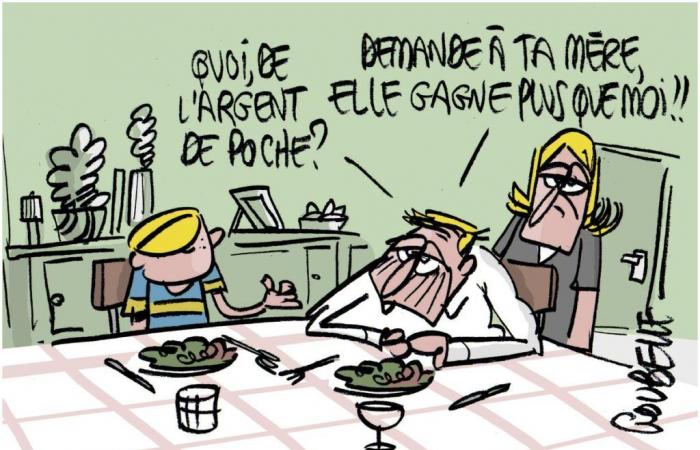“We don’t feel concerned at all,” says Chloé Theret, who lives in a common-law relationship with her partner and their two children, aged 5 years and 18 months, in the Aigre sector. At 34, the independent administrative secretary has almost always had higher income than her temporary partner. “On average 500 euros more. Sometimes less, sometimes more.”
They are part of those Charentais households in which Madame contributes more to the family income than Monsieur. “At home, there is no question of gender when it comes to money. We are parents first and foremost. And he doesn’t feel at all inferior because he earns less,” says Chloé, who points out the progress still to be made on the subject in society. “For example, the fact that a woman takes a day off for a sick child seems normal to everyone. If it’s up to man to do it, it suddenly seems extraordinary.”
Émilie (1), aged 36, lives in Ruelle with her partner and their three-year-old son. She has been an executive assistant in a small company for 4 years, he has always been a chef. If money, between them, has never been taboo, there remains this slight embarrassment when it comes to revealing one’s salary publicly. “What I can tell you is that I earn 500 euros more than my partner.”
“We say to ourselves that if there is one of us from now on who has to stop working, it’s him”
Which was not always the case. “When we met, I had another job and my salary was lower. But this change has not changed anything. It is sometimes even a subject of jokes. We tell ourselves that if there is one of us from now on who has to stop working, it’s him.”
The difference in their income appears on the tax forms, “but for the rest, it’s 50/50. We have a joint account for household expenses. On the other hand, everyone has their own personal account, which is used for our little individual pleasures, such as shopping, giving gifts or inviting the other to a restaurant. It’s like a secret garden.”
A joint account for the household, a personal account for pleasures
An operation deemed balanced by the couple, as with Chloé and her partner. “We start from the principle that what we earn is to support the family. We have a boat, we have to row together, it doesn’t matter who has the biggest paddle,” the image states, however, that everyone also kept a separate bank account.
“It allows you to make these small pleasure expenses without having to justify yourself, even if you have never reproached yourself for it. It’s also a small feminist step forward. Before, the woman had to ask her husband for authorization to make an expense,” she recalls.
In this household, the house being Mr.’s, bank rents and bills are debited, historically, from his own account, when Mrs. takes care of daily expenses. “It is also a received idea that the one who pays for everything related to housing pays more, since the increase in the cost of living.”
The editorial team advises you
And among sensitive positions, the car is the subject of conflict par excellence. “For us it’s clear. He takes care of it, I pay,” laughs Chloé. “And for leisure, we decide together. There is no ‘since it’s you who earns more, it’s you who decides’”. An operation resolutely geared towards sharing, in an economic system which has no use for the separation of couples since a broken home means twice as many homes, household appliances or cars sold.
Émilie’s home also ensures a better balance in the pace of life. “He works Monday to Friday, and only at lunchtime. And I debauch relatively early, around 4:30 p.m., which means that by the end of the day, we have a real family life. We are privileged,” she concludes.
(1) The first name has been changed
Figures for wage gaps in Charente
“The latest figures we have date from 2022. In the private sector, the average net salary of women in France is 14.1% lower than that of men,” recalls Évelyne Videau, president of Cidff de Charente. “It’s progressing slightly since it was 15.6% in 2021. But that’s still, on average, 394 euros net less each month.” In Charente, the more women are paid, the greater the gap with men. Female employees living in Puymoyen are the best paid in the department (16 euros net per hour on average), and the gap with men is the largest in Charente (5.7 euros difference). It is the Ruffécoises who receive the lowest average salary, at 11.4 euros net per hour, compared to 12.4 for men.
Working hours: the other balancing factor
“Money remains a relatively taboo subject in France for most couples,” explains Natacha Bonnin, co-president of the Entreprendre au Féminin Charente association. “And there is the question of fulfillment at work. More and more women are trying to start their own business, because once you are over 45, to find a more interesting and better paid job, you often fail.”
For Évelyne Videau, “there are three factors of inequality in work: salary, the diversity of professions, with categories which are still too gendered, and working time”. The president of the Information Center on the Rights of Women and Families (Cidff) in Charente recalls that more than a quarter of women in France work part-time, compared to 8.4% of men. “We also noticed that RTT had benefited men more than women, since they took their Wednesday off to look after the children, while men tended to take their Friday off to go do sports.” she summarizes.






